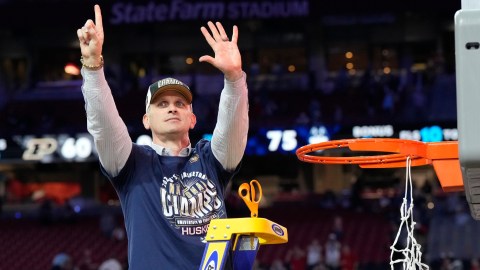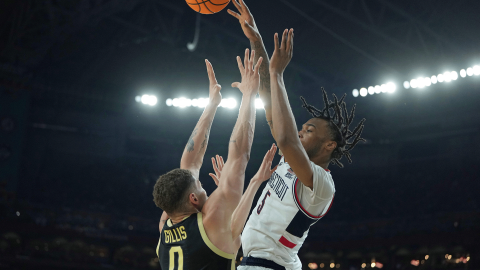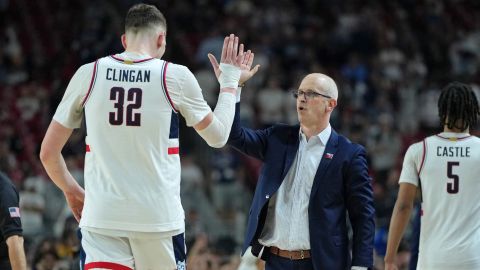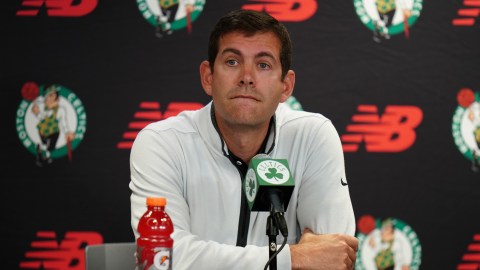March Madness involves some of the most exciting, precise, fastest-paced basketball around. The stakes can't be higher, as each possession can determine the outcome of a team's season.
Accordingly, officials are also supposed to be on top of their game, walking the thin line of when to call fouls and when to keep the whistle out of their mouths.
This year, however, it seems that the officials don't know the rules, or just flat out don't care about them.
It started during the Big East Tournament, when Rutgers was eliminated after St. John's' Justin Brownlee danced out of bounds, ball in hand, with 1.7 seconds left on the clock.
Those last 1.7 seconds never were played though, as officials walked off the court without reviewing the play, something that takes very little time and effort, thanks to advances in courtside technology.
That very same officiating crew then voluntarily withdrew from the rest of the tournament, after heavy criticism following the game. Rutgers forcibly withdrew, though, at the hands of the officials.
The crew withdrawing wasn't enough; it should never officiate another college game.
Missing the occasional call is a forgivable offense, as the officials are only human, but a flat-out refusal to use state-of-the-art technology at a crucial moment such as that is inexcusable — unforgivable even.
But it was just the beginning.
This year, at least three games in the early rounds of the NCAA tournament ended mired in controversy, following a similar suit to the shenanigans that occurred during the Big East Tournament.
First, there was "FoulGate," which occurred at the end of the Butler-Pittsburgh game. For those living under rocks, Butler's Shelvin Mack fouled Gilbert Brown on a half-court prayer with 2.2 seconds remaining. The officials got this call correct, as it was just a horrible foul by Mack.
After Brown missed the potential game-winning free throw, Matt Howard then grabbed the rebound and the game was headed for overtime … until Nasir Robinson fouled Howard 90 feet away from the basket, sending him to the line and sending Pittsburgh packing from the tournament early yet again.
As an observer, many wondered, "Why decide the game on such a meaningless foul?" While the letter of the law is clear, the spirit needs to take precedent here and send the game to overtime. The official got this one all mixed up.
The next horrific call took place in the waning moments of the Washington-UNC game, in which an ill-advised long-range shot missed completely, touched a UNC player and went out of bounds with 1.4 seconds remaining, but Washington was only given .5, barely enough time for a catch-and-shoot.
Washington coach Lorenzo Romar went on the record to say that he asked the officials to look at the time on the clock again, using replay technology to get the call right. He was shaken off by the official, who said they had already checked.
But had they checked, the clock would have read 1.4 and not .5, and could've considerably altered the outcome of the game. UNC advanced, while Washington went home in disbelief.
Still, the most recent call, that which decided the Texas-Arizona game, was arguably the worst. At the end of the contest, Texas received a five-second violation after Cory Joseph called timeout four seconds into the count.
Did referee Richard Cartmell forget how to count? It certainly appeared that he did, as the call completely changed the complexion of the game, as Arizona scored on the ensuing possession, winning 70-69.
While the last situation was purely objective, and the five-second violation is one of the more difficult calls to make, it makes one wonder why there aren't more comprehensive replays involved in these situations.
The NCAA is on the forefront of technology, and with all of this courtside, anything but the right call in a crucial situation should be looked upon as completely unacceptable at this point.
The first three rounds of March Madness were as exciting as ever, but that wasn't even the big story this past weekend. Instead, with their wholly avoidable lapses in judgement, the officials took the spotlight away from the buzzer-beaters, amazing performances, and Cinderellas that make the NCAA tournament one of the best events in sports.
What should be done about the officiating crisis? Leave your thoughts below.
NESN's college basketball coverage is presented by Bodog.net.



